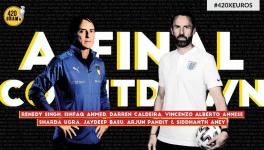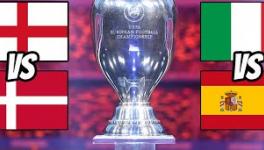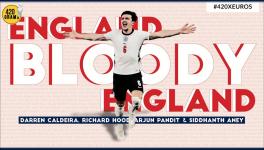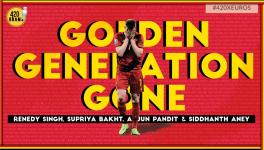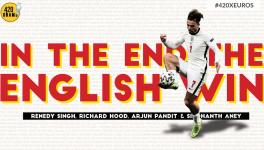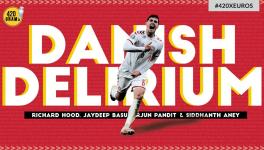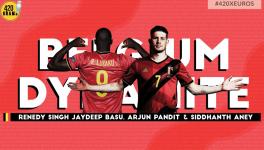FIFA World Cup Semi-Finals: Of Golden Generations and Unfulfilled Destinies
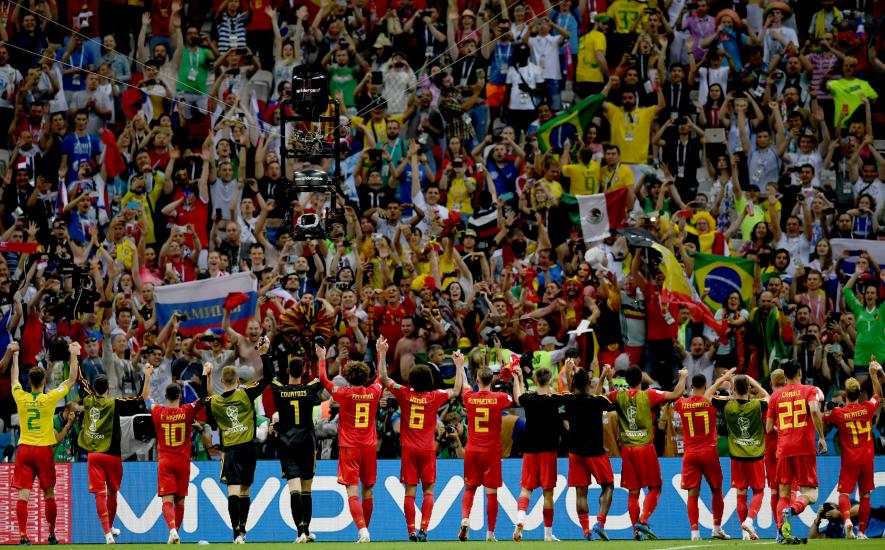
The players in the Belgium football team at the FIFA World Cup are its golden generation, the best in the world, who could be part of the roster of any leading team (Pic: IANS).
Centuries earlier, when the Earth was a much bigger place, medieval cartographers used the phrase ‘Hic Svnt Leones’ to mark where their maps reached the unknown and the dangerous. The phrase literally translates into ‘Here are lions’ -- a warning as well as an invitation, asking the traveller to choose their destiny. We have learnt a fair bit since then, about who we are, where we live, and whom we share the planet with. While cartographers may not have a use for the phrase anymore, competitive sport could do with it.
The 2018 FIFA World Cup has almost reached the finale. The hosts -- the biggest surprise and most joyful story -- are finally out, and, of the four standing, only one has fulfilled the predictions of getting where they are. The other three in the semi-final line-up are fulfilling a larger narrative, one that encompasses a history of sporting pain, constant political turmoil, and in Belgium’s case, a golden generation on the cusp of fulfillment. For them, this is the edge of the world. Ahead lie lions.
For Belgium, this is a revisit of an early cusp-of-glory moment, when they went up against Diego Maradona’s Argentina in 1986. That entire World Cup is remembered for the Argentine, and was illuminated by his goals against England. Easily forgotten is the moment he produced in the semi-final against Belgium to take his team to the final. Belgium’s contribution to the entire World Cup, one where they beat the Soviet Union and Spain in the knockouts, was reduced to this one picture -- and for years since then, the picture only added to Maradona’s legend.
Also Read | FIFA World Cup: Belgium Play Counter-Strike, Leave Brazil Bleeding
The term golden generation is thrown about too freely nowadays to actually carry any weight. With European football having expanded to levels where even players from the smallest nations frequently get representation in the big leagues, a golden generation is a fluid, perennial river of talent, no more a singular source illuminated once in a few decades.
That said, this is Belgium’s golden generation. For a nation which has relied on a ‘collective spirit’ for “overachieving” on the world stage, this generation of Belgian footballers are among the best in the world -- from goal to goal, they have a roster which would walk into the majority of national sides today.
Then there is the additional caveat. To borrow from cricket author Rahul Bhattacharya’s landmark essay ‘The 281 era’, this is a set of players in whom a nation recognises their own increasing aspirations and, sometimes, their best selves.
In 2014, this generation had not evolved enough to win. Because to win, after all, you have to learn to lose. Eden Hazard was four years younger, a trickster without application. Kevin de Bruyne was a club football nomad, a talent whose ticket was held by Chelsea, but was being passed around the German league.
Also Read | What India Can Learn From England Squad's Show at FIFA World Cup
Chelsea also held Romelu Lukaku, but Jose Mourinho deemed him surplus to requirements and sent him off on loan, to lower projects where he flourished. At the national level though, he was -- despite being a prolific scorer -- often overlooked in favour of Christian Benteke. The biggest problem with the team though -- onlookers and commentators would often say -- was in their manager Marc Wilmots’ defensive approach. The truth of this was found out after the Euro in 2016, when Wilmots’ defensive, safety first approach finally knocked them out of a tournament where they were favourites.
The federation relented to the pressure and appointed Roberto Martinez, who at the time had just been sacked by Everton, a mid-level team in the English Premier League, to the surprise of many. His backroom staff provoked more excitement: namely a legend of the game in England and France, Thierry Henry. Belgium rebooted. The system update worked. Martinez was often accused of being one dimensional when he was coach of Everton, and yet, at Belgium he has been anything but.
His masterful maneuvering of Kevin de Bruyne, got them through Brazil. His plan to rest his players and play a second string against England also seems to have worked wonders -- giving his substitutes an opportunity for game time and release pressure on the squad. Now come France, pre tournament favourites, managed by a Gallic version of Wilmots himself in Didier Deschamps (in Deschamps’ defence, he has achieved success through his pragmatism).
Underachieving golden boys
In the other semi-final lie two absurd societies. Both talented, both underachievers. England’s golden generations have floundered for years. It is tough to say which was golden and which turmeric. Most experts agree that England’s true golden generation was the 1996 Euro squad. Marshalled by a great defence, and speared with a blessed attack, only penalties could have done them in. And did.
Also Read | FIFA World Cup: Croatia and the Demons From History
That penalty ghost put paid to many more ‘golden generations’. First fell the Scholes-Beckham-Nevilles gang. Then fell the two sons of Adam who could never play alongside each other -- Frank Lampard and Steven Gerrard. Through it all a Swede held charge, underachieving almost with intent. This, their most underrated squad on whom few pinned their hopes, has done what last happened over two decades ago. They even won on penalties! One step more and they will cause chaos on Wimbledon Sunday.
This brings us, of course, to Croatia. Of the lot, they are the ones who were here most recently, exactly two decades ago. That Croatian team rode to the semi-final on a wave of nationalistic pride, from a nation that had only declared independence in 1991.
It was a talented team, one which had made the majority of the Yugoslavian Youth Championships winners in 1987. At the Euro in ‘96, they did this. They lost to the hosts in ‘98. They have beaten the hosts in 2018, albeit in a physically and emotionally draining battle. They have suffered, despite a talented squad. They have suffered because of a talented squad. As causes go, this one makes a case for being strong. As legs go, they look weak.
For these three, this is very much a dive into the unknown. These generations, golden, turmeric and glaze, have known nothing of footballing success. They have known only disappointment. At the edge of the world now, they will peer over to see whatever they want to see.
Also Read | World Cup: Lukaku, Mbappe and the Colonial Ghosts Within Belgium and France
Golden generations age. Golden generations fail. And golden generations go away. Dylan Thomas’ inspirational poem comes to mind: Do not go gentle into that good night. Rage, rage against the dying of the light.
In a pre-match press conference, Roberto Martinez, Belgium’s unfancied yet transformative manager, paraphrased words that wouldn’t be out of place on a medieval ship.
“If we approach this match with fear within us, we will bring ourselves down. To play without fear will be the one thing which would help us most,” he said.
To confront lions, it is best perhaps to pretend to be one.
Get the latest reports & analysis with people's perspective on Protests, movements & deep analytical videos, discussions of the current affairs in your Telegram app. Subscribe to NewsClick's Telegram channel & get Real-Time updates on stories, as they get published on our website.









